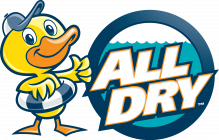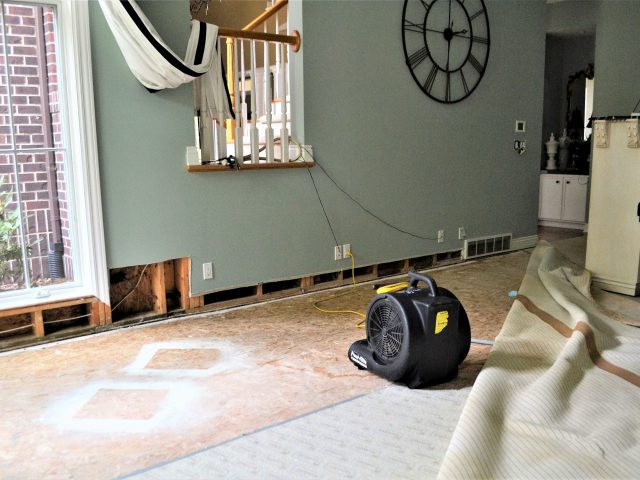Living in Northeast Florida means enjoying warm coastal breezes and sunny weather—but it also means dealing with humidity, heavy rain, hurricanes, and even the occasional flooding. All of these factors can lead to unwanted water damage in your home or business.
At All Dry Services of Jacksonville, we know that after water damage, moisture control and structural drying are critical in restoring your property and preserving its long-term integrity. Whether it’s from a roof leak during hurricane season or a plumbing failure in your kitchen, ignoring moisture can lead to serious issues like mold growth, warped materials, and structural weakness.
In this guide, we’ll walk you through how professional moisture management works and why All Dry is the trusted name for water damage restoration in Northeast FL, including Jacksonville, St. Augustine, Orange Park, and surrounding areas.
Why Structural Drying Matters in Jacksonville Homes
After water enters your home—whether from a storm surge or a broken water heater—it can seep into walls, flooring, and insulation. Without proper drying, this trapped moisture becomes the perfect environment for mold to thrive, especially in Florida’s naturally humid climate.
That’s why we use high-powered dehumidifiers, air movers, and thermal imaging to locate hidden moisture and dry affected areas quickly and thoroughly. Our team’s knowledge of Florida’s building codes and typical construction materials in Jacksonville homes allows us to act fast and restore your home with precision.
Structural Drying Essentials: What You Need to Know
The Science Behind Moisture Control
Water moves fast—and it can hide in drywall, concrete, and subflooring. Effective drying means more than just running a fan. It takes a combination of:
- Dehumidifiers to lower humidity levels
- Air movers to circulate dry air
- Thermal cameras to locate hidden moisture pockets
- Moisture meters to track drying progress
In the humid environment of Northeast FL, managing the indoor climate during drying is critical to preventing long-term mold issues.
Understanding Water Damage Categories & Classes
- Category 1: Clean water (e.g., burst pipe)
- Category 2: Gray water (e.g., washing machine overflow)
- Category 3: Black water (e.g., sewage backup or floodwaters)
- Class 1: Minimal damage
- Class 2: Significant absorption into floors/walls
- Class 3: Ceiling, walls, insulation affected
- Class 4: Deep saturation (concrete, brick)
Knowing the category and class of water damage helps our Jacksonville-based team create the right remediation plan quickly.
Initial Inspection and Equipment Planning
At All Dry Jacksonville, our experts begin with a detailed moisture inspection using tools like infrared imaging and hygrometers. Based on what we find, we’ll customize the equipment setup to your property’s needs, whether it’s a beach home in Ponte Vedra or a commercial building in downtown Jacksonville.
Drying Technologies We Trust
- Dehumidification: Removes excess moisture from the air
- Air Movement: Accelerates drying of walls, floors, and ceilings
- Controlled Heating: Helps evaporate water without damaging materials
These techniques are especially important in Florida homes, which often feature stucco walls, tile flooring, and wood cabinetry that can all be sensitive to moisture.
Monitoring Moisture Levels for Effective Drying
We continually monitor the drying process using:
- Moisture meters
- Thermo-hygrometers
- Detailed documentation
Tracking moisture ensures that your home is not only dry to the touch but safe from future mold risks.
Mold and Microbial Growth: The Florida Factor
Due to Florida’s humidity, mold can start forming in as little as 24-48 hours after water damage.
Prevention Tips:
- Use a dehumidifier year-round
- Ventilate bathrooms and kitchens
- Address roof and plumbing leaks immediately
- Schedule regular inspections from a local pro like All Dry
Need Mold Remediation in Jacksonville?
If you already see mold forming, our licensed technicians will contain the affected area, remove contaminated materials, and sanitize your space thoroughly using HEPA filtration and antimicrobial solutions.
Health & Safety: Why You Need a Certified Team
We follow strict safety protocols and wear proper PPE to protect ourselves—and you—from contaminants, mold spores, and bacteria. Our crews are trained in OSHA safety, EPA standards, and Florida restoration compliance.
Northeast Florida Materials: What We Consider
- Wood framing: Can warp or rot
- Drywall: Soaks up water quickly
- Concrete slabs: Hold moisture longer
- HVAC systems: Spread humidity if not properly managed
We tailor our drying strategy to your home’s materials, ensuring structural soundness and indoor air quality.
Project Planning & Communication
Whether you’re restoring a home in Riverside or managing a water loss at your Jacksonville Beach business, we:
- Provide detailed timelines and milestones
- Keep homeowners and property managers updated
- Coordinate with insurance adjusters and contractors
All Dry Jacksonville offers emergency response 24/7, because we know how quickly things can go from bad to worse.
Real Northeast Florida Cases
- Hurricane Flooding in St. Augustine: Full-scale drying and mold prevention in a historic property.
- Pipe Burst in Mandarin: Quick containment, drying, and rebuild for a residential kitchen.
- Mold Discovery in Orange Park: Long-term leak led to microbial growth; we restored the home and improved moisture management.
Why Choose All Dry Jacksonville?
- Local Knowledge – We understand Florida humidity and how it affects homes in our region.
- Fast Emergency Response – Available 24/7 across Jacksonville, St. Augustine, Ponte Vedra & beyond.
- Advanced Equipment – Industrial-grade tools to dry and restore your property quickly.
- Certified Technicians – Fully trained in mold remediation, water damage restoration, and structural drying.

